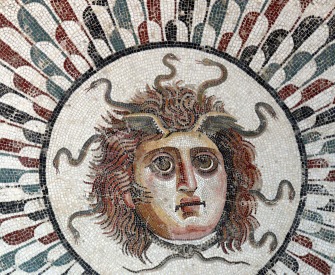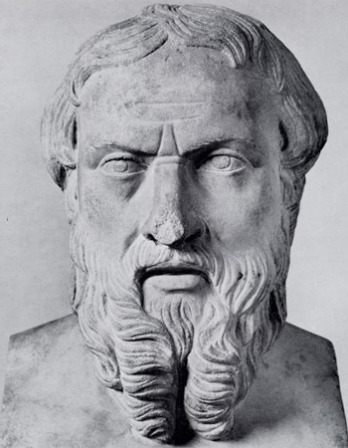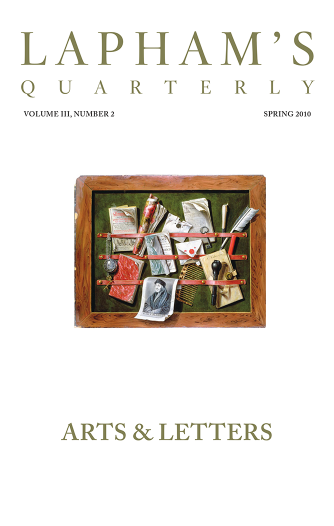With a view to attack luxury and remove the thirst for wealth, Lycurgus introduced his most exquisite political device, namely, the institution of common messes, so that people might eat with one another in companies, of common and specified foods, and not take their meals at home, reclining on costly couches at costly tables, delivering themselves into the hands of servants and cooks to be fattened in the dark like voracious animals, and ruining not only their characters but also their bodies by surrendering them to every desire and all sorts of surfeit, which call for long sleeps, hot baths, abundant rest, and, as it were, daily nursing and tending. This was surely a great achievement, but it was a still greater one to make wealth “an object of no desire,” as Theophrastus says, and even “unwealth,” by this community of meals and simplicity of diet. For the rich man could neither use nor enjoy nor even see or display his abundant means when he went to the same meal as the poor man—so that it was in Sparta alone of all the cities under the sun that men could have that far-famed sight, a Plutus blind, and lying as lifeless and motionless as a picture. For the rich could not even dine beforehand at home and then go to the common mess with full stomachs; the rest kept careful watch of him who did not eat and drink with them and reviled him as a weakling and one too effeminate for the common diet.
They met in companies of fifteen, a few more or less, and each one of the messmates contributed monthly a bushel of barley meal, eight gallons of wine, five pounds of cheese, two and a half pounds of figs, and in addition to this, a very small sum of money for such relishes as flesh and fish. Besides this, whenever anyone made a sacrifice of first fruits, or brought home game from the hunt, he sent a portion to his mess. For whenever anyone who was belated by a sacrifice or the chase, he was allowed to sup at home, but the rest had to be at the mess. For a long time this custom of eating at common mess tables was rigidly observed. For instance, when King Agis, on returning from an expedition in which he had been victorious over the Athenians, wished to sup at home with his wife, and sent for his rations, the military commanders refused to send them to him; and when on the following day his anger led him to omit the customary sacrifice, they laid a fine upon him.
Boys also used to come to these public messes as if they were attending schools of sobriety; there they would listen to political discussions and see instructive models of liberal breeding. There they themselves also became accustomed to sport and jest without scurrility, and to endure jesting without displeasure. Indeed, it seems to have been especially characteristic of a Spartan to endure jesting, but if anyone could not bear up under it, he had only to ask it, and the jester ceased. As each one came in, the eldest of the company pointed to the door and said to him, “Through that door no word goes forth outside.” And they say that a candidate for membership in one of these messes underwent the following ordeal. Each of the messmates took in his hand a bit of soft bread, and when a servant came along with a bowl upon his head, then they cast it into this without a word, like a ballot, leaving it just as it was if he approved of the candidate, but if he disapproved, squeezing it tight in his hand first. For the flattened piece of bread had the force of a perforated, or negative, ballot. And if one such is found in the bowl, the candidate is not admitted to the mess, because they wish all its members to be congenial. The candidate thus rejected is said to have been “caddished,” for caddichus is the name of the bowl into which they cast the pieces of bread.
Of their dishes, the black broth is held in the highest esteem, so that the elderly men do not even ask for a bit of meat, but leave it for the young men, while they themselves have the broth poured out for their meals. And it is said that one of the kings of Pontus actually bought a Spartan cook for the sake of having this broth, and then, when he tasted it, disliked it; whereupon the cook said, “O King, those who relish this broth must first have bathed in the River Eurotas.” After drinking moderately, they go off home without a torch, for they are not allowed to walk with a light, either on this or any other occasion, that they may accustom themselves to marching boldly and without fear in the darkness of night. Such then is the fashion of their common messes.
From Life of Lycurgus. Traditionally considered the founder and chief lawgiver of Sparta, Lycurgus first enters the historical record in The Histories of Herodotus around two hundred years after his purported heyday. He is believed to have instituted the form of government unique to his polis, a two-part body consisting of the gerousia (the council of elders, including two kings) and the apella (assembly).
Back to Issue





